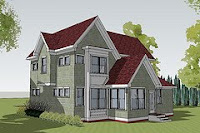 Did you know that Australians now live in houses that are double the size of those they lived in 50 years ago? Did you know that the average Australian has 6-9 people in their house during one year?
Did you know that Australians now live in houses that are double the size of those they lived in 50 years ago? Did you know that the average Australian has 6-9 people in their house during one year?We live in expensive, isolated splendour. The overseas students we meet through my husband's university ministry say that most visitors from other countries return home after years of study or work never having entered an Australian home. Most Australians live next door to people who never set foot inside their front door.
Modern suburbia eerily parallels CS Lewis' description of hell in The Great Divorce, as Ben Pfahlert pointed out during his talk on Philippians 1 at last weekend's MTS Challenge Conference Victoria. CS Lewis' words as he describes the "grey town" of hell are almost prophetic:
I seemed to be standing in a busy queue by the side of a long, mean street. ... I had been wandering for hours in similar mean streets, always in the rain and always in evening twilight. ... I never met anyone. But for the little crowd at the bus stop, the whole town seemed to be empty. ...
'It seems the deuce of a town,' I volunteered, 'and that's what I can't understand. The parts of it that I saw were so empty. Was there once a much larger population?''Not at all' said my neighbour. 'The trouble is that they're so quarrelsome. As soon as anyone arrives he settles in some street. Before he has been there twenty-four hours he quarrels with his neighbour. But before the week is over he's quarrelled so badly that he decides to move. Very likely he finds the next street empty because all the people there have quarrelled with their neighbours - and moved. If so, he settles in. If by any chance the street is full, he goes further. But even if he stays, it makes no odds. He's sure to have another quarrel pretty soon, and then he'll move on again. Finally he'll move right out to the edge of town and build a new house. ...
'They've been moving on and on. Getting further apart. ... Astronomical distances. There's a bit of rising ground near where I live and a chap has a telescope. You can see the lights of the inhabited houses, where those old ones live, millions of miles away. Millions of miles from us and from one another. Every now and then they move further still.'
As the bus in the story rises in the air, and the grey town spreads out below from horizon to horizon, it's modern suburbia I'm seeing from an aeroplane window in my mind's eye.
It should be different for us as Christians - but is it? My friend and her husband, who work with overseas students, aim to have 100 unbelievers in their home every year! Her example and
Ben's talk challenged me to choose compassion over control, comfort and convenience, and to work harder at overcoming the splendid isolation of the modern home.
brenner_ron and icopythat from flickr
3 comments:
Dear Jean,
Thanks for this (and for other recent posts, which I have found challenging and encouraging - but seem to lack the brain-space to say anything particularly insightful in response!). Today's post reinforced to me the importance of hospitality, which seems so alien to our Australian lifestyles, yet which we are commanded to do as Christians. I think it's tied up with openness and generosity and vulnerability and authenticity and giving without expecting in return. In my experience, hospitality can have a powerful influence. Let's keep it up, messy houses and busy lives notwithstanding!
Fiona McLean
Kind of in a parallel way, one of the things I've really noticed living where we do, here in the UK is how much more we bump into people in the street. We live right between a big uni and a busy pedestrianised shopping area. Our church and daughter's school are very near by. Playgroup is at church, the park is just across the road. We walk almost everywhere. So do many of our friends from church, school, playgroup etc. We very rarely use a car. It means I usually will bump into someone I know picking up bread at the local shops, on the way to school etc. It's good for getting into conversations with people outside of the usual context.
It's quite different to where we used to live in the suburbs in Perth. You would catch people in the shopping mall there, but not with the frequency you do here. It helped me to better understand how people from overseas find Australia lonely - bigger houses, bigger blocks, more time driving and not bumping into people in the street. Little interactions like that can make quite a difference.
Obviously, that sort of thing doesn't replace having people inside your house, but it is good for relationships.
Dear mattnbec,
I really agree with the value of walking and that leading to opportunities to build relationships. I walk most places - school, local library, etc - and that means that, if I bump into someone, we can stop for a chat, or walk together for a bit, which you can't really do if you are in a car! I've also realised that my walking makes me highly visible - people from school will often comment that they saw me walking somewhere.
Fiona
Post a Comment